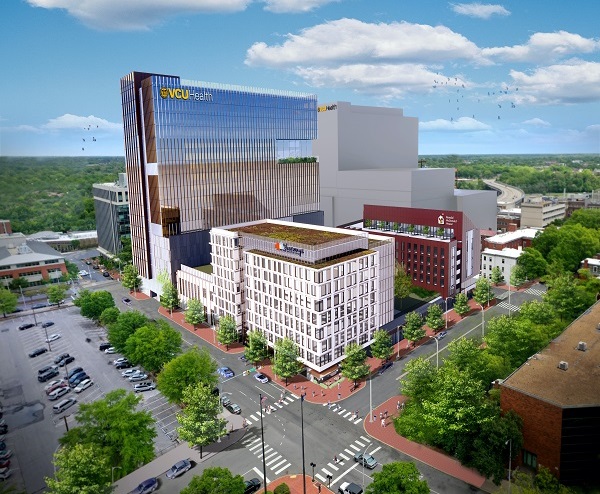
A rendering of the office tower and complex that would have replaced the Public Safety Building. (BizSense file)
Editor’s note: This is the second installment in a series analyzing the failed VCU Health-anchored development in downtown Richmond.
By the time Art Kellermann made a final plea to his superior, Virginia Commonwealth University President Michael Rao, the then-CEO of VCU Health System had been lobbying for weeks for senior leadership to reconsider a downtown development deal that he warned could prove costly.
It was July 8, 2021, just days before the health system was to finalize a lease to become master tenant and anchor of a $325 million redevelopment of Richmond’s old Public Safety Building site downtown.
“I am alarmed that the costs and risks of the (project) keep climbing, and the developer wants to pressure us to say yes tomorrow afternoon without fully understanding what we are signing up for,” Kellermann said in an email to Rao, referring to Capital City Partners, the development team that was spearheading the project.
Kellermann’s email reiterated prior claims that the deal’s terms had become lopsided, putting the health system on the hook for any project cost overruns, on top of $617 million in rent over 25 years, for a building that he considered an unnecessary expense amid a pandemic that had turned office work on its head and had strained the health system operationally and financially.
Arguing that the 545,000-square-foot building plans had been “so rigidly fixed” with particular uses and commitments to the city, Kellermann told Rao: “…we have few, if any, options to repurpose elements of the structure to enhance its value or more readily manage its cost. As matters stand, we may end up with a building that is ill suited to our needs.”
“I regret the need to press you in this way, but the developer is demanding that we commit to cover the increasingly unrealistic terms without even taking sufficient time to fully weigh the costs and risks. I cannot, in good conscience, endorse this,” he told Rao, who is president of the health system as well as the university and chairs the health system authority’s Board of Directors.
“At the very least,” Kellermann added, “we must clearly understand our costs and risks and consider the consequences of failure before committing to a deal that could cripple us for decades to come.”
A week later, Kellerman, at administrators’ urging, would ultimately sign off on the deal he had advocated against, memorializing it through a multiparty agreement between VCU Health, Capital City Partners and Project 10th Street LLC, the ownership entity tied to financing group Oak Street Real Estate Capital.
Two years later, that email to Rao was one of several highlighted communications that were presented to the VCU Health board and VCU’s Board of Visitors, in a closed-door meeting in June that stretched four hours.
The boards were receiving a presentation from law firm Saul Ewing of an after-action review that the health system board had initiated last fall, amid the project’s collapse. While a 24-page PowerPoint that outlined the review’s findings was released to the public, the emails were among hundreds that Richmond BizSense obtained over the summer through Freedom of Information Act requests.
The emails give context to the PowerPoint, which referred to such things as “developer issues” without elaboration, a “‘Get it done’ attitude” at the project’s outset and unspecified risks that were assumed with the lease.
The emails show that Kellermann and other administrators and legal counsel had been sounding alarms about the deal that the health system would ultimately back out of, through a process called defeasance that ended up requiring a $73 million exit payment from VCU Health.
Additional commitments from the defeasance require the health system to pay for demolition of the Public Safety Building site and continue real estate tax payments to the city, bringing the known tally to at least $80 million.
Two weeks ago, in a letter to General Assembly leadership calling for changes to VCU Health’s governance structure in light of the failed project, Gov. Glenn Youngkin said the cost to the health system could end up totaling as much as $100 million.
Rao responds
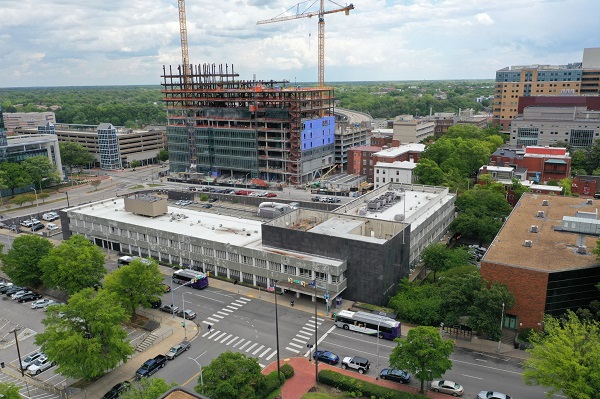
The Public Safety Building as viewed along Ninth Street in 2020, with the under-construction VCU Health outpatient building rising behind it. (BizSense file)
VCU Health had agreed in principle – before Kellermann joined the health system in October 2020 – to be the master tenant for the multi-building complex at 500 N. 10th St. The project was to include a high-rise office tower to support the health system’s nearby Adult Outpatient Pavilion and other uses to support its nearby children’s hospital.
The development also included a reconnection of Clay Street through the 3-acre site, hence its reference by administrators as “the Clay Street project.” It emerged from the ashes of the unsuccessful Navy Hill project, through a letter of intent signed by Capital City Partners’ Susan Eastridge and then-VCU Health CFO Melinda Hancock, who by mid-2021 was on her way out of the health system to take another job.
Hancock and Eastridge crafted the lease that the multiparty agreement would be based on. Hancock had similarly been involved in the outpatient pavilion and children’s hospital developments, which were built on land owned by VCU or VCU Health. The Clay Street project was different in that VCU Health would be renting a privately developed building, with the goal of keeping the property tax-generating for the city.
But the terms of the deal made the health system responsible for more than just rent, Kellermann told Rao. Commitments to cover project cost overruns, as well as annual real estate tax payments to the city in perpetuity, for a building that he said would not generate much revenue could end up requiring VCU Health to dip into its endowment – a move that could put its credit rating at risk.
“This might force us to progressively drain our quasi-endowment to cover these costs,” Kellermann said, referring to the MCV Foundation endowment that, in mid-2021, managed nearly $900 million in total assets.
“Otherwise,” he said, “VCU will have to step in. That’s a scenario nobody wants.”
Rao – in the only email sent by him among the hundreds about the project that BizSense has obtained – responded to Kellermann in a July 9 message copied to university and health system counsels, and to Karol Gray, senior vice president and CFO for VCU.
“…as I often do, because of the nature of this project and its implications you and others describe for both (boards), I am going to pull in both Karol and (Mike Melis, then-VCU counsel) for their advice and awareness,” Rao told Kellermann, adding, “I will need Karol’s review of this and will ask her to connect with you directly.”
“In reading the concerns of outside counsel that you have shared, I can understand the level of alarm you’re feeling and share an interest in being sure of what’s happening here and why new things, apparently including new deadlines, are being pushed,” Rao wrote. “Given that this appears to be described as political, we will indeed need to be careful about how we respond and when, if at all before the imposed apparent new deadline.”
Rao was referring to “political stakes” that both Kellermann and Matt Conrad, vice president for government and external relations for VCU and VCU Health, had previously referred to in correspondences as being “high.”
‘Walking away would have disastrous effects’
In responding to a May 30, 2021, email that Kellermann sent to him and Rao, Conrad, who had helped facilitate negotiations with the city, described the project as “perhaps the biggest economic development accomplishment of this mayor,” referring to Richmond Mayor Levar Stoney.
“Walking away would have disastrous effects on important deals with the city,” Conrad said, referring specifically to coordination of the planned VCU Athletics Village with the city’s Diamond District project. “…That said, if you truly believe there is lopsided, unmitigated risk that could hinder delivery of VCUHS’ mission, that needs to take priority and should be evaluated and discussed.”
In emails over the weeks that followed, Conrad takes the position that Kellermann is out to stop the project, telling colleagues that he “is trying to blow up the deal.”
When Kellermann asked Conrad, on July 3, the status of the project and why a June 30 closing deadline had lapsed, despite assertions that the deal’s financing terms were contingent on that date, Conrad forwarded his response to Gray, the VCU CFO, with the message: “FYI. He won’t stop.”
Addressing Kellermann, Conrad said the deal involved VCU Health partnering with “three parties with three different styles,” describing the city as “slow and stodgy,” the developer as “anxious about closing on the lender’s timeline,” and the lender – Chicago-based Oak Street, now a division of New York-based Blue Owl Capital – as “highly sophisticated and aggressive.”
Conrad described the June 30 closing date as “admittedly unrealistic for a deal this complex with essentially four parties,” and he stressed that the project involved more than just office space for VCU Health, noting the building would also house new facilities for nonprofts The Doorways and Ronald McDonald House Charities, and would provide a needed pharmacy, daycare and parking.
Conrad noted that the health system and VCU had sought for years to secure the property and that the deal included a negotiated option for VCU Health to purchase the property after its 25-year lease, at 10 percent of the fair market value or $31 million, whichever was greater at the time the option was exercised.
“There are no second chances with this deal. Mayor Stoney’s team will box us out if we blow up the current deal, and we will lose the opportunity to control this parcel that is so essential,” Conrad told Kellermann.
Conrad added that several City Council members “stuck their necks out for this deal even though they weren’t comfortable with the chosen process,” all because, he said, “of VCU and our (nonprofit) partners’ involvement and the community benefits embedded in the deal.”
“I see no second bites at the apple,” Conrad said. Referring to Stoney, he added, “We will have embarrassed him and his administration who thought they were executing a deal” – about which “they are already bragging,” he said – “with sophisticated parties who knew what they were getting into.”
There was also a general reluctance to rework the deal, the emails show, because it would reopen financing, jeopardizing the lease terms that were based on a lower interest rate.
“Aside from the political egg on the face, the deal is financed at a rate we could not otherwise secure at this time. We would wind up building a smaller project for the same amount,” Conrad said, later adding: “Let’s focus our energy on making the best of the deal we have, because we are not getting another one.”
Administration’s position ‘has not changed’
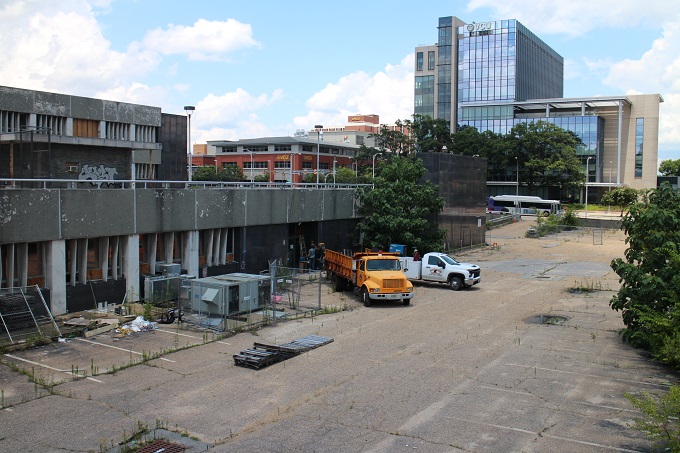
The Public Safety Building site is across Leigh Street from VCU’s College of Health Professions building. (BizSense file photo)
In his July 8 final plea to Rao, Kellermann questioned whether VCU Health’s “partners” in the deal were approaching it with the health system’s best interests in mind.
“From the outset, the developer exploited our desire to partner with the city to address common interests in transforming this blighted parcel to push a grossly one-sided project that offers limited value to VCU Health but saddles us with all of the project’s costs and risks,” Kellermann wrote.
Referring to Conrad, he added: “Matt’s determination to force it forward, irrespective of the unreasonableness of the developers demands, makes me question which side he’s working for.”
With the June 30 closing deadline passed, Kellermann then asked Gray and Melis if that presented an opportunity to rework the project, offering in another email to meet personally with Stoney and city officials about it.
“…I am not trying to ‘blow up the deal,’” Kellermann said. “I’m trying to protect our interests and preserve our relationship with the City and other elected officials. If this deal does not go forward because the developer pushed us beyond all reason, I am confident that we can craft a far more sustainable project with the city that meets all the City’s needs, VCU’s needs and the needs of our subtenants.”
The next day, July 9, Gray sent Kellermann an email listing reasons why senior leadership still stood by the project and wanted him to sign off on it. The email largely mirrors a list of talking points that Conrad had sent Gray less than an hour earlier.
Stating that she and another official, whose name is redacted from the email under a FOIA exception, “understand that the contract needs to be signed by July 15,” Gray told Kellermann: “In the absence of Mike Rao’s I have highlighted responses to your concerns.”
“Based on the information below,” Gray added, “my advice to sign the contract on behalf of the health system remains the same.”
The email states that there had been “no material changes to the deal” since the health system board had recently approved it for a third time, that VCU had sought to secure the site for over a decade, and that pulling a small portion from VCU Health’s endowment could be an option to address any financial concerns.
“VCU Administration’s position on this deal has not changed,” the email states.
Hours later, Kellermann replied and told Gray he would sign off on the deal.
“President Rao delegated decision making to you with (VCU counsel’s) review,” Kellermann wrote. “I understand your guidance, and I have instructed (VCU Health’s counsel) to proceed with the deal.”
A year later, in 2022, after rising construction costs and other challenges prompted the developer to propose a scaled-down version of the project, VCU Health would decide to back out of the deal through the defeasance process that came with the $73 million exit payment.
That November, Kellermann resigned as VCU Health CEO at the request of Rao, according to a statement from Kellermann that accompanied an announcement from Rao. The announcement did not specify a reason for the change.
‘The emails speak for themselves’
Reached Friday, Kellermann, now a contract health policy adviser for the Virginia Health Workforce Development Authority, declined to comment for this story.
“The emails speak for themselves,” Kellermann said.
Eastridge, the Capital City Partners principal who led the Clay Street development with fellow principal Michael Hallmark, likewise declined to comment when asked if she wanted to respond to Kellermann’s claims about the deal being lopsided or pushed on VCU Health.
A request to Rao, Conrad and Gray for comment was answered by Rao, who said he recommended the after-action review and that VCU Health has implemented or is in the process of implementing the review’s recommendations.
In an email to BizSense, Rao said: “It is clear to everyone that the Clay Street project did not turn out as expected or hoped. It lacked appropriate due diligence, and we continue to invest heavily in analyzing, understanding and addressing all of the ways we need to improve for the future.”
Rao said the recommendations and other “best practices” to be implemented include using third-party advisers “in high-risk, complex and/or high-dollar transactions,” establishing dedicated project management teams “with demonstrated expertise in project management and authority aligned to their legal entity,” and identifying and addressing conflicts of interest “with any entity or person involved.”
Other priorities include connecting projects to strategic plans and “identifying and assessing foreseeable risks and mitigations strategies,” involving the board early in projects through subcommittees and timely updates about benefits and risks, and advocating to appointing authorities “for appropriate expertise and commitment” among board appointees.
The review also called for the boards to improve culture “to foster open communication” and enhance membership orientation and annual education. Saul Ewing was paid over $340,000 for its work on the review.
Rao said VCU is also addressing the governance structure of the health system and the university, which are separate legal entities but with some overlap in leadership with Rao and other dual administrators and board members. Rao said a report from Chartis Group, a healthcare consulting firm the boards have been working with since May, is expected soon.
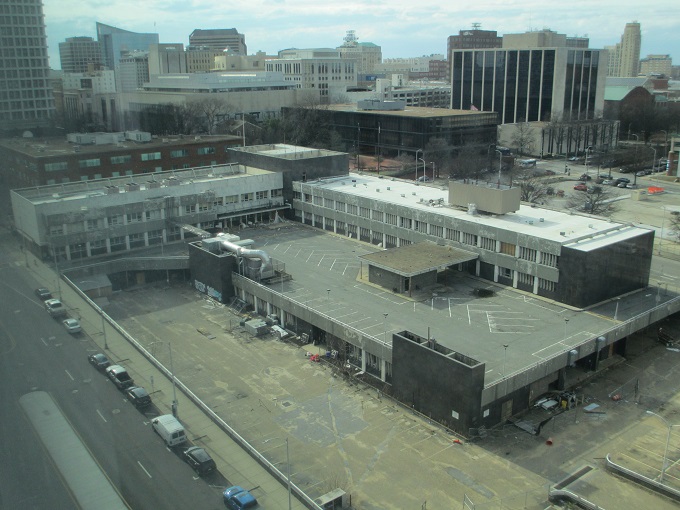
The Public Safety Building property at 500 N. 10th St. has sat vacant since the project collapsed. (BizSense file)
Describing the Clay Street project as “an anomaly,” Rao noted VCU’s and VCU Health’s track record in completing multiple real estate developments totaling billions of dollars in investment, including the outpatient pavilion, children’s hospital, and engineering and STEM buildings.
“Those four projects alone represent more than $1B in successful construction efforts – on top of more than $4B in other successful projects that came together in the past 15 years,” Rao said in his email. “The university and health system are both committed to making needed changes and improvements to help ensure success on every project in these large and complex environments that involve many people.”

A rendering of the office tower and complex that would have replaced the Public Safety Building. (BizSense file)
Editor’s note: This is the second installment in a series analyzing the failed VCU Health-anchored development in downtown Richmond.
By the time Art Kellermann made a final plea to his superior, Virginia Commonwealth University President Michael Rao, the then-CEO of VCU Health System had been lobbying for weeks for senior leadership to reconsider a downtown development deal that he warned could prove costly.
It was July 8, 2021, just days before the health system was to finalize a lease to become master tenant and anchor of a $325 million redevelopment of Richmond’s old Public Safety Building site downtown.
“I am alarmed that the costs and risks of the (project) keep climbing, and the developer wants to pressure us to say yes tomorrow afternoon without fully understanding what we are signing up for,” Kellermann said in an email to Rao, referring to Capital City Partners, the development team that was spearheading the project.
Kellermann’s email reiterated prior claims that the deal’s terms had become lopsided, putting the health system on the hook for any project cost overruns, on top of $617 million in rent over 25 years, for a building that he considered an unnecessary expense amid a pandemic that had turned office work on its head and had strained the health system operationally and financially.
Arguing that the 545,000-square-foot building plans had been “so rigidly fixed” with particular uses and commitments to the city, Kellermann told Rao: “…we have few, if any, options to repurpose elements of the structure to enhance its value or more readily manage its cost. As matters stand, we may end up with a building that is ill suited to our needs.”
“I regret the need to press you in this way, but the developer is demanding that we commit to cover the increasingly unrealistic terms without even taking sufficient time to fully weigh the costs and risks. I cannot, in good conscience, endorse this,” he told Rao, who is president of the health system as well as the university and chairs the health system authority’s Board of Directors.
“At the very least,” Kellermann added, “we must clearly understand our costs and risks and consider the consequences of failure before committing to a deal that could cripple us for decades to come.”
A week later, Kellerman, at administrators’ urging, would ultimately sign off on the deal he had advocated against, memorializing it through a multiparty agreement between VCU Health, Capital City Partners and Project 10th Street LLC, the ownership entity tied to financing group Oak Street Real Estate Capital.
Two years later, that email to Rao was one of several highlighted communications that were presented to the VCU Health board and VCU’s Board of Visitors, in a closed-door meeting in June that stretched four hours.
The boards were receiving a presentation from law firm Saul Ewing of an after-action review that the health system board had initiated last fall, amid the project’s collapse. While a 24-page PowerPoint that outlined the review’s findings was released to the public, the emails were among hundreds that Richmond BizSense obtained over the summer through Freedom of Information Act requests.
The emails give context to the PowerPoint, which referred to such things as “developer issues” without elaboration, a “‘Get it done’ attitude” at the project’s outset and unspecified risks that were assumed with the lease.
The emails show that Kellermann and other administrators and legal counsel had been sounding alarms about the deal that the health system would ultimately back out of, through a process called defeasance that ended up requiring a $73 million exit payment from VCU Health.
Additional commitments from the defeasance require the health system to pay for demolition of the Public Safety Building site and continue real estate tax payments to the city, bringing the known tally to at least $80 million.
Two weeks ago, in a letter to General Assembly leadership calling for changes to VCU Health’s governance structure in light of the failed project, Gov. Glenn Youngkin said the cost to the health system could end up totaling as much as $100 million.
Rao responds

The Public Safety Building as viewed along Ninth Street in 2020, with the under-construction VCU Health outpatient building rising behind it. (BizSense file)
VCU Health had agreed in principle – before Kellermann joined the health system in October 2020 – to be the master tenant for the multi-building complex at 500 N. 10th St. The project was to include a high-rise office tower to support the health system’s nearby Adult Outpatient Pavilion and other uses to support its nearby children’s hospital.
The development also included a reconnection of Clay Street through the 3-acre site, hence its reference by administrators as “the Clay Street project.” It emerged from the ashes of the unsuccessful Navy Hill project, through a letter of intent signed by Capital City Partners’ Susan Eastridge and then-VCU Health CFO Melinda Hancock, who by mid-2021 was on her way out of the health system to take another job.
Hancock and Eastridge crafted the lease that the multiparty agreement would be based on. Hancock had similarly been involved in the outpatient pavilion and children’s hospital developments, which were built on land owned by VCU or VCU Health. The Clay Street project was different in that VCU Health would be renting a privately developed building, with the goal of keeping the property tax-generating for the city.
But the terms of the deal made the health system responsible for more than just rent, Kellermann told Rao. Commitments to cover project cost overruns, as well as annual real estate tax payments to the city in perpetuity, for a building that he said would not generate much revenue could end up requiring VCU Health to dip into its endowment – a move that could put its credit rating at risk.
“This might force us to progressively drain our quasi-endowment to cover these costs,” Kellermann said, referring to the MCV Foundation endowment that, in mid-2021, managed nearly $900 million in total assets.
“Otherwise,” he said, “VCU will have to step in. That’s a scenario nobody wants.”
Rao – in the only email sent by him among the hundreds about the project that BizSense has obtained – responded to Kellermann in a July 9 message copied to university and health system counsels, and to Karol Gray, senior vice president and CFO for VCU.
“…as I often do, because of the nature of this project and its implications you and others describe for both (boards), I am going to pull in both Karol and (Mike Melis, then-VCU counsel) for their advice and awareness,” Rao told Kellermann, adding, “I will need Karol’s review of this and will ask her to connect with you directly.”
“In reading the concerns of outside counsel that you have shared, I can understand the level of alarm you’re feeling and share an interest in being sure of what’s happening here and why new things, apparently including new deadlines, are being pushed,” Rao wrote. “Given that this appears to be described as political, we will indeed need to be careful about how we respond and when, if at all before the imposed apparent new deadline.”
Rao was referring to “political stakes” that both Kellermann and Matt Conrad, vice president for government and external relations for VCU and VCU Health, had previously referred to in correspondences as being “high.”
‘Walking away would have disastrous effects’
In responding to a May 30, 2021, email that Kellermann sent to him and Rao, Conrad, who had helped facilitate negotiations with the city, described the project as “perhaps the biggest economic development accomplishment of this mayor,” referring to Richmond Mayor Levar Stoney.
“Walking away would have disastrous effects on important deals with the city,” Conrad said, referring specifically to coordination of the planned VCU Athletics Village with the city’s Diamond District project. “…That said, if you truly believe there is lopsided, unmitigated risk that could hinder delivery of VCUHS’ mission, that needs to take priority and should be evaluated and discussed.”
In emails over the weeks that followed, Conrad takes the position that Kellermann is out to stop the project, telling colleagues that he “is trying to blow up the deal.”
When Kellermann asked Conrad, on July 3, the status of the project and why a June 30 closing deadline had lapsed, despite assertions that the deal’s financing terms were contingent on that date, Conrad forwarded his response to Gray, the VCU CFO, with the message: “FYI. He won’t stop.”
Addressing Kellermann, Conrad said the deal involved VCU Health partnering with “three parties with three different styles,” describing the city as “slow and stodgy,” the developer as “anxious about closing on the lender’s timeline,” and the lender – Chicago-based Oak Street, now a division of New York-based Blue Owl Capital – as “highly sophisticated and aggressive.”
Conrad described the June 30 closing date as “admittedly unrealistic for a deal this complex with essentially four parties,” and he stressed that the project involved more than just office space for VCU Health, noting the building would also house new facilities for nonprofts The Doorways and Ronald McDonald House Charities, and would provide a needed pharmacy, daycare and parking.
Conrad noted that the health system and VCU had sought for years to secure the property and that the deal included a negotiated option for VCU Health to purchase the property after its 25-year lease, at 10 percent of the fair market value or $31 million, whichever was greater at the time the option was exercised.
“There are no second chances with this deal. Mayor Stoney’s team will box us out if we blow up the current deal, and we will lose the opportunity to control this parcel that is so essential,” Conrad told Kellermann.
Conrad added that several City Council members “stuck their necks out for this deal even though they weren’t comfortable with the chosen process,” all because, he said, “of VCU and our (nonprofit) partners’ involvement and the community benefits embedded in the deal.”
“I see no second bites at the apple,” Conrad said. Referring to Stoney, he added, “We will have embarrassed him and his administration who thought they were executing a deal” – about which “they are already bragging,” he said – “with sophisticated parties who knew what they were getting into.”
There was also a general reluctance to rework the deal, the emails show, because it would reopen financing, jeopardizing the lease terms that were based on a lower interest rate.
“Aside from the political egg on the face, the deal is financed at a rate we could not otherwise secure at this time. We would wind up building a smaller project for the same amount,” Conrad said, later adding: “Let’s focus our energy on making the best of the deal we have, because we are not getting another one.”
Administration’s position ‘has not changed’

The Public Safety Building site is across Leigh Street from VCU’s College of Health Professions building. (BizSense file photo)
In his July 8 final plea to Rao, Kellermann questioned whether VCU Health’s “partners” in the deal were approaching it with the health system’s best interests in mind.
“From the outset, the developer exploited our desire to partner with the city to address common interests in transforming this blighted parcel to push a grossly one-sided project that offers limited value to VCU Health but saddles us with all of the project’s costs and risks,” Kellermann wrote.
Referring to Conrad, he added: “Matt’s determination to force it forward, irrespective of the unreasonableness of the developers demands, makes me question which side he’s working for.”
With the June 30 closing deadline passed, Kellermann then asked Gray and Melis if that presented an opportunity to rework the project, offering in another email to meet personally with Stoney and city officials about it.
“…I am not trying to ‘blow up the deal,’” Kellermann said. “I’m trying to protect our interests and preserve our relationship with the City and other elected officials. If this deal does not go forward because the developer pushed us beyond all reason, I am confident that we can craft a far more sustainable project with the city that meets all the City’s needs, VCU’s needs and the needs of our subtenants.”
The next day, July 9, Gray sent Kellermann an email listing reasons why senior leadership still stood by the project and wanted him to sign off on it. The email largely mirrors a list of talking points that Conrad had sent Gray less than an hour earlier.
Stating that she and another official, whose name is redacted from the email under a FOIA exception, “understand that the contract needs to be signed by July 15,” Gray told Kellermann: “In the absence of Mike Rao’s I have highlighted responses to your concerns.”
“Based on the information below,” Gray added, “my advice to sign the contract on behalf of the health system remains the same.”
The email states that there had been “no material changes to the deal” since the health system board had recently approved it for a third time, that VCU had sought to secure the site for over a decade, and that pulling a small portion from VCU Health’s endowment could be an option to address any financial concerns.
“VCU Administration’s position on this deal has not changed,” the email states.
Hours later, Kellermann replied and told Gray he would sign off on the deal.
“President Rao delegated decision making to you with (VCU counsel’s) review,” Kellermann wrote. “I understand your guidance, and I have instructed (VCU Health’s counsel) to proceed with the deal.”
A year later, in 2022, after rising construction costs and other challenges prompted the developer to propose a scaled-down version of the project, VCU Health would decide to back out of the deal through the defeasance process that came with the $73 million exit payment.
That November, Kellermann resigned as VCU Health CEO at the request of Rao, according to a statement from Kellermann that accompanied an announcement from Rao. The announcement did not specify a reason for the change.
‘The emails speak for themselves’
Reached Friday, Kellermann, now a contract health policy adviser for the Virginia Health Workforce Development Authority, declined to comment for this story.
“The emails speak for themselves,” Kellermann said.
Eastridge, the Capital City Partners principal who led the Clay Street development with fellow principal Michael Hallmark, likewise declined to comment when asked if she wanted to respond to Kellermann’s claims about the deal being lopsided or pushed on VCU Health.
A request to Rao, Conrad and Gray for comment was answered by Rao, who said he recommended the after-action review and that VCU Health has implemented or is in the process of implementing the review’s recommendations.
In an email to BizSense, Rao said: “It is clear to everyone that the Clay Street project did not turn out as expected or hoped. It lacked appropriate due diligence, and we continue to invest heavily in analyzing, understanding and addressing all of the ways we need to improve for the future.”
Rao said the recommendations and other “best practices” to be implemented include using third-party advisers “in high-risk, complex and/or high-dollar transactions,” establishing dedicated project management teams “with demonstrated expertise in project management and authority aligned to their legal entity,” and identifying and addressing conflicts of interest “with any entity or person involved.”
Other priorities include connecting projects to strategic plans and “identifying and assessing foreseeable risks and mitigations strategies,” involving the board early in projects through subcommittees and timely updates about benefits and risks, and advocating to appointing authorities “for appropriate expertise and commitment” among board appointees.
The review also called for the boards to improve culture “to foster open communication” and enhance membership orientation and annual education. Saul Ewing was paid over $340,000 for its work on the review.
Rao said VCU is also addressing the governance structure of the health system and the university, which are separate legal entities but with some overlap in leadership with Rao and other dual administrators and board members. Rao said a report from Chartis Group, a healthcare consulting firm the boards have been working with since May, is expected soon.

The Public Safety Building property at 500 N. 10th St. has sat vacant since the project collapsed. (BizSense file)
Describing the Clay Street project as “an anomaly,” Rao noted VCU’s and VCU Health’s track record in completing multiple real estate developments totaling billions of dollars in investment, including the outpatient pavilion, children’s hospital, and engineering and STEM buildings.
“Those four projects alone represent more than $1B in successful construction efforts – on top of more than $4B in other successful projects that came together in the past 15 years,” Rao said in his email. “The university and health system are both committed to making needed changes and improvements to help ensure success on every project in these large and complex environments that involve many people.”

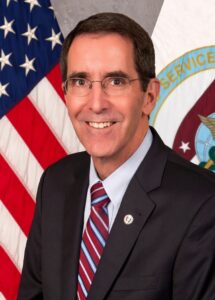
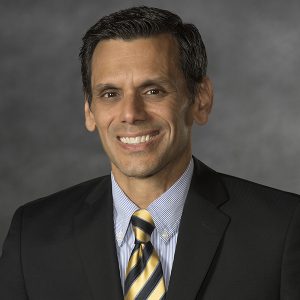

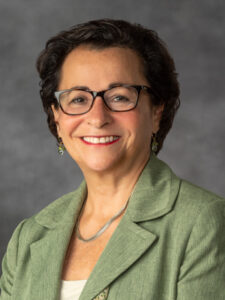
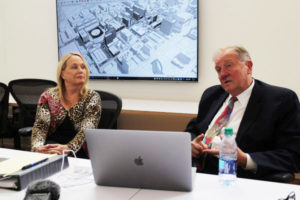


Looks like Conrad should be held accountable as well. His “guidance” to the health system is irresponsible and bizarre.
Dig deeper — how about the political party Rao associates with — from the leadership at City Hall on up?
keep digging. There’s a $100 M pot of gold buried somewhere.
One more likely reason why MCV, a respected institution, didn’t want to be further associated in the public mind with VCU that was excited to maybe rise to “Sports School” status.
No doubt!
Conrad and Rao are the culpable ones. Kellermann, doing the right thing, got the axe and took the fall. A Leadership change is needed at VCU
I am surprised Rao is still there. I guess the board/alumni is on his side?
Go to his website — there is a picture of him with a mask on with “Doctor” Jill Biden.
All you need to know.
“Stoney needs this.”
Makes sense now. He is protected.
What makes Dr. Biden not a doctor? I’m confused by your use of the quotation marks around the title here.
I could explain at great length, but first, do we call Joe “Doctor Biden” because he has a JD?
Suffice it to say, in our culture in the USA, the title “Doctor” is usually reserved for physicians of some kind. And the further you get away from the hard sciences, the more people calling you, or you calling yourself “doctor”, such as when you have something like a Doctor of Theology or Education, a tell of pretense.
none of that is remotely accurate. I would assume based on that response you have never set foot in academic & health care institutions or churches where individuals with PhD’s are referred to as Dr on a daily basis.
Smelled from the start; good on paper, great for certain politicians, bad for commonsense fudiciary responsibilities…
A tale of politics and incompetence. Funny how those two quite often go hand in hand.
Thanking Richmond Bizsense for some good reporting. The deal was a political plum for an inept mayor? Rao – delegating the final decision when he knew the risks were high. If true, he should resign for that alone. He had every reason to bring additional focus to the project before approval but failed to do so. This debacle should be a case study for public administration and business students. But still thinking there is more to this story.
Why should he resign? He and Stoney are doing what their political masters are telling them to do — which hurts the taxpayers the most, of course.
And here I thought that it were only Weathermen that kept their jobs when they were wrong and issued bad advice and decisions. I’ll call Rao “The Weatherman” from here on.
This seems like a good place to point out that The Graduate Hotel downtown, is full of VCU freshmen because the Johnson Hall dorm has serious mold issues. That’s not cheap.
VCU also had to lay off professors.
That $100 Million tossed away for NOTHING is already impacting VCU
so is this why a box of kleenex in the hosptial cost $109?
I wrote this comment a year ago and there were a few who didn’t like it, but it still seems relevant so I’ll post it again here:
“Rao’s been riding the wave of the economy throughout his tenure, operating VCU as a property developer first and foremost. Now that the economy is slowing and the property market is softening, watch for him transition out of office and into the role of board member/fundraiser/C-suite glad-hander.”
Astute! Prescient!
Many people in corrupt politically aligned institutions “Fail Up” because they are doing what they were put in to do.
If they do a great job for their masters, you get a Russia or Venezuela situation. These are not meritocracies.
You have described what has become standard operating procedure for big cities in the United States: San Fran, LA, Seattle, Portland, Chicago, NY, etc. They who lead fail up.
When the socialists won in Venezuela, everyone knew they were going to steal all the infrastructure built by the private oil companies and break all the contracts they had with the government and things were going to get a lot worse for the economy, THAT was par for the course. What was not realized that this was not merely a Brazilian-style bunch of leftists who knew enough to not totally kill a golden goose, but some really full on political criminals who wanted to put their political cronies in power at every level of business, so they even fired engineers… Read more »
Ironic the only one that was tuned into had bad the university had negotiated this deal, Kellerman, is the only one that took a fall. Gray or Rao could have cancelled or at least postponed the deal and instead pushed it through without understanding the consequences. How I lost $100 million and still kept my job………
Funny, but you miss the City Hall angle.
Great reporting!
An “anomaly” and they working to ensure processes are in place so something like this does not happen again. What processes, your leadership of the health system said wait this is a BAD deal and did everything except release his own statement/op-ed to the press and walk down East Marshall Street hold a sign that says we are getting screwed; and you still ignored his concerns for political reasons. What policy would could on implement to avoid bad choice to appease politicians??? An insurance policy to cover the costs for bad decisions made to appease politicians I do not think… Read more »
“It is clear to everyone that the Clay Street project did not turn out as expected or hoped. It lacked appropriate due diligence, and we continue to invest heavily in analyzing, understanding and addressing all of the ways we need to improve for the future.” Clearly what is required is Rao be FIRED. Kellermann was scapegoated on this entire deal, and Rao pulled a Col. Klink. “Those four projects alone represent more than $1B in successful construction efforts – on top of more than $4B in other successful projects that came together in the past 15 years,” VCU has too… Read more »
Jonathan has done an incredible job of reporting on this matter.
I can see Rao,Stoney,and Michael Jones all standing there at a “sophisticated party”!
This seemed like such a breach of fiduciary responsibility that the VCU board should not just clean house, but request criminal charges. Until someone goes to jail for wasting what will be more than $100M when its all said and done, these types of failures will continue to occur.
Right on! These emails are stunning… Someone is blowing the whistle on a deal so bad it’s not in the best interest of the health system to pursue it and we have folks like Conrad working against the system’s interest to prop up a political interest…Rao and Conrad should be shown the door immediately and prosecuted…$100 million dollars….were their pockets being lined as well?
That’s not generally how it works. You are promised help to get into a higher position elsewhere. Ever wonder how the present Mayor got his job, where the avalanche of support came from, what he had to do get all the funding possible for a many with zero management experience and zero Richmond ties to successfully carpetbag Richmond? Tim Kaine had to work it for years to get a mere city council seat, this guy just magically shows up with an expensive and slick ad campaign and the liberals fell for it — I even partly fell for it —… Read more »
The mayor of Richmond would be out of his depth in a parking lot puddle.
Stoney was elected over Berry because of Morrissey. There was genuine fear he’d be elected Mayor and PACs felt Stoney had a better shot of winning than Berry, so the most qualified candidate (Berry) fell by the wayside. The second term was rigged by the ridiculous election process. Eight candidates split the vote with Stoney winning with only 35% support. If there had been a ranking system in place, Kim Grey would have had a better opportunity to win. She was the most qualified.
Wouldn’t this be a bit like them investigating themselves? The Rector and Stoney both used to work for Terry Mac-Daddy.
Great nuts and bolts investgative reporting. Hope you are eligible for a Pulitzer Prize. This is what newspapers used to do every day.
Great reporting and writing, Jonathan — keep it up!
Wow! Great old style reporting, now missing from the Old Lady rag in town.
It astounds me that after this debacle and loss of funds they are still on the hunt for more Richmond property to acquire.